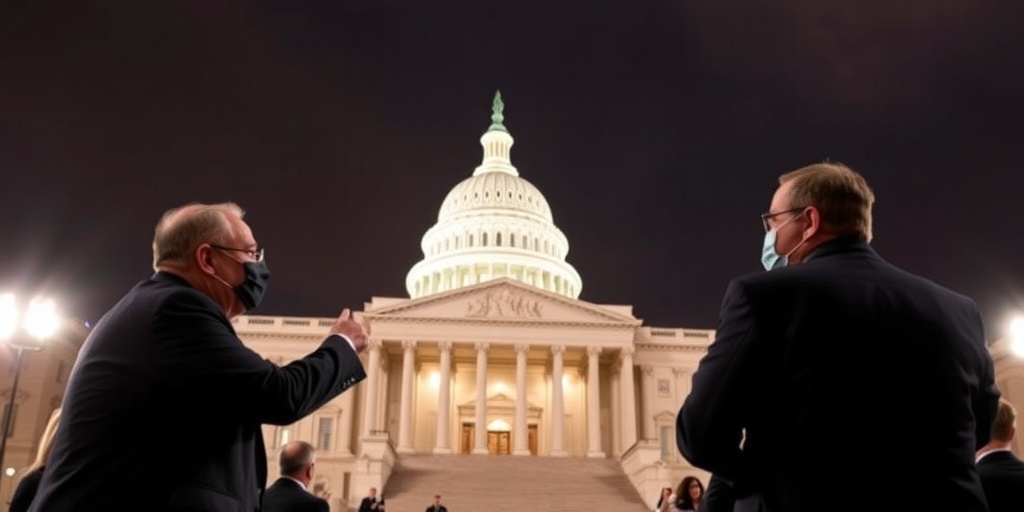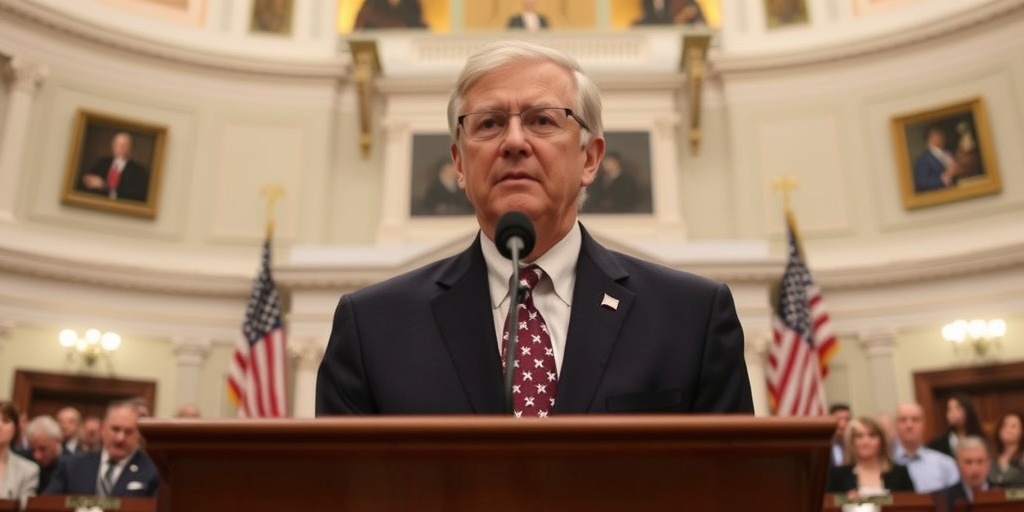Now Reading: Senate Engages in Contentious Overnight ‘Vote-a-Rama’ on Budget
-
01
Senate Engages in Contentious Overnight ‘Vote-a-Rama’ on Budget
Senate Engages in Contentious Overnight ‘Vote-a-Rama’ on Budget

Senate Moves Toward Passing Republican Budget Plan Amidst ‘Vote-A-Rama’
Early Friday morning, the Senate was poised to pass a Republican-backed budget resolution through a party-line vote, following a time-honored parliamentary ritual known as a “vote-a-rama.” This lengthy process, characterized by a barrage of proposals — many likely to never see the light of day — unfolded as senators braced themselves for an all-nighter filled with procedural motions and speeches, mostly delivered to an empty chamber.
The age of Senate members, averaging 65, did not deter them from engaging in this late-night session. Staff members arrived with thick briefing folders and caffeinated drinks, preparing for the marathon ahead. Republicans focused on advocating for their budget resolution, which is vital for advancing President Trump’s ambitious fiscal agenda. Meanwhile, Democrats geared up to expose the implications of these plans on the American populace, striving to create a narrative that could politically harm Republicans in upcoming elections.
Senate Minority Leader Chuck Schumer expressed the Democratic position as he urged his colleagues to present amendments countering Trump’s fiscal agenda. “This is going to be a long, drawn-out fight,” Schumer proclaimed. “Democrats are going to hold the floor all day long and all night long to expose how Republicans want to cut taxes for billionaires while gutting things Americans care about most.”
The passage of this budget resolution represents a crucial step for the Republicans, especially in the context of differing strategies among House and Senate GOP members on how to achieve the president’s fiscal goals. It remains a contentious issue, with Republicans like Senator Lindsey Graham emphasizing the responsibility of their majority to fulfill the promises made to the electorate. “People are counting on us,” Graham asserted, just moments before the voting began. “They’re counting on this Republican majority to give the president the money he needs to do the job that he promised to do, and we’re going to deliver." He added that he was prepared to work late into the night if necessary.
For Democrats, who lacked sufficient votes to block the Republican budget, the vote-a-rama represented a strategic opportunity. It allowed them to challenge GOP priorities and create a record of uncomfortable votes for Republicans, which could be leveraged during the upcoming midterm elections. The Senate’s rules permitted an unlimited number of amendments during the budget process, leading to an unpredictable series of votes that could stretch on until Democrats ultimately ran out of steam.
One of the first moves made by Democrats was a proposal aimed at prohibiting tax cuts for individuals earning over $1 billion annually. This initiative was designed to underline their narrative that Republicans were prioritizing the wealthy at the expense of everyday Americans. Schumer asked his Republican counterparts directly, “Yes or no? Do you believe billionaires should get another tax break or not?” The proposal narrowly failed along party lines, signaling the likely outcome for many of the night’s subsequent amendments.
Despite this setback, Democrats continued to introduce various proposals throughout the evening, focusing on protecting food assistance and Medicaid funding. While most of the votes conformed to partisan divisions, some Republican senators occasionally sided with the Democrats. Notably, Senators Susan Collins of Maine and Josh Hawley of Missouri broke ranks to support measures that sought to curtail tax cuts for the wealthy and reduce hedge fund influence in the housing market, respectively.
Although the vast majority of Democratic amendments were unsuccessful, the votes by Collins and Hawley might provide them with some political cover in the future, allowing them to present a more independent stance when advantageous. The night progressed with a relentless pace of proposals and votes, reflecting the deep divisions that characterize contemporary American politics.
As the all-nighter continued, it became increasingly clear that the session would likely extend into the early hours of the morning, cementing the vote-a-rama as a defining aspect of Senate procedure. The outcome of this budget plan will not only shape the immediate fiscal landscape but also set the stage for the broader political battles leading up to the midterm elections. Senate members endured the long night with the understanding that their decisions would resonate well beyond the chamber walls, influencing public perception and policy direction in the months ahead.
Stay Informed With the Latest & Most Important News
Previous Post
Next Post
-
 01New technology breakthrough has everyone talking right now
01New technology breakthrough has everyone talking right now -
 02Unbelievable life hack everyone needs to try today
02Unbelievable life hack everyone needs to try today -
 03Fascinating discovery found buried deep beneath the ocean
03Fascinating discovery found buried deep beneath the ocean -
 04Man invents genius device that solves everyday problems
04Man invents genius device that solves everyday problems -
 05Shocking discovery that changes what we know forever
05Shocking discovery that changes what we know forever -
 06Internet goes wild over celebrity’s unexpected fashion choice
06Internet goes wild over celebrity’s unexpected fashion choice -
 07Rare animal sighting stuns scientists and wildlife lovers
07Rare animal sighting stuns scientists and wildlife lovers





















